
|
|
In Memory's Eye (Part 4) John Ward Honourable Members 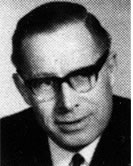 Forever associated with the adoption of the Maple Leaf as Canada's national flag is the name of John Ross Matheson. Of Scottish decent, he represented the riding of Leeds in Ontario. Forever associated with the adoption of the Maple Leaf as Canada's national flag is the name of John Ross Matheson. Of Scottish decent, he represented the riding of Leeds in Ontario.
It was Matheson who chaired the parliamentary committee that sat for months before deciding, almost by happenstance, on the final design of the red maple leaf on white between two red panels. The fuss raised by Prime Minister Pearson's decision that the time had come for Canada, as an independent nation, to have its own flag, can never be fully grasped by succeeding generations. Until then, Canada got by using a version of the Red Ensign, a British flag, which was constant a reminder of its colonial past. When the committee reported back to the House with the Maple Leaf as its choice, the debate that followed led to one of the most uproarious, emotional, unruly scenes ever witnessed on the floor of the House. It rivalled the historic Pipeline Debate of 1957 in intensity, and exceeded anything that followed, including the 1982 constitutional debate. Matheson had served overseas in World War II with the Royal Canadian Horse Artillery from 1940 to 1944, when he suffered wounds in Italy that led to his retirement with the rank of Captain. He was a participant in the battle for Ortona, the fiercest engagement of the Italian campaign between volunteer German and volunteer Canadian troops. As a result of his wounds he walked with a limp. His speeches in the House were a wonder to behold and report. On his desk he placed an attaché case from which he extracted an endless supply of documents, mainly quotations, which made up a large, if not major, part of his argument. These he replaced helter-skelter in a disorderly mess after he finished speaking, and sent the attaché case up to the Hansard office so that his quotations could be verified, one of the most important tasks of the compilers of the Official Report. Three, four, or five reporters, depending on the length of his speech, would gather around the opened case and attempt to find the pertinent quotations each had reported. Frenzied pirhanas attacking prey in the Amazon River is the only simile that comes to mind. Matheson deported himself as a gentleman throughout the long days of the flag debate, and earned a lasting and honoured position in Canada's parliamentary pantheon. Following his service in Parliament he became a judge.
He had been a parliamentary assistant to the legendary C. D. Howe, the all-powerful Minister of Reconstruction and Supply. Howe had been Minister of Defence Production during World War II, knew everybody in industry, transport, and public service and, more importantly, knew how to get things done, the right levers to press, the right doors to push, the right turns to take in the labyrinthine maze of mandarin dominated Ottawa. McIlraith learned from Howe, and as his career progressed in Parliament he inherited some of Howe's mantle, particularly in dealing with recalcitrant public servants. His hand seldom showed, but if results were what was wanted by a succession of Prime Ministers, it was to George McIlraith they turned. At one time he enjoyed more influence on Parliament Hill than any official, and in the Commons proper he knew how to maneuver the passage of government business quickly and efficiently through to final adoption. He enjoyed politics. He knew how the game was played. Even after being relegated to the Senate, his interest in the political doings taking place in the Commons never flagged, and he was often to be seen watching and listening to what transpired in the place he loved so well, usually from a spot in the public gallery rather than from the more exposed Senators Gallery. He had a lean figure, spoke in a quiet voice, almost inaudible at times, and had remnants of sparse red hair circling his temples. Also, he wore glasses. I was shocked out of my standing a couple of times when members of the protective staff mistook me for him, and called "Good night, Senator!", or "Good day, Senator", as the time warranted. It was they who should have been wearing glasses. By profession a chartered accountant, he sidestepped provincial politics and took the direct route to the loftier federal platform, being first elected Member of Parliament for Perth in 1953, and becoming Minister of National Health and Welfare in 1957. He was a loyal follower of Diefenbaker, in good times and in bad. He embodied the tenets of political conservative politics. A staunch upholder of tradition, he was a fierce opponent of any move to sever traditional links with what he had been taught was "the mother country", Great Britain. Loud in his denunciation of Grits (Liberals) and Grit policies, he was a trenchant fighter for his beloved Tories (Progressive Conservatives) and Tory policies. He made his position clear on whatever topic came up for debate, spoke clearly and without equivocation, and was a gift to the Hansard reporters taking down his interventions in debate. Like Diefenbaker, he decried the removal of "Royal" from the Canadian Postal Service, and raged against the removal of the Red Ensign as the national flag. A man of his times, he never concealed his feelings. Jay Waldo Monteith.
The elder Nowlan inherited all the grace and charm bestowed on him at birth by an Irish father and French mother. The blending of the two races, he grew into one of the most well-liked men ever to sit among colleagues in the House of Commons. He earned and held the respect of his peers. Contentious partisan party politics he eschewed, and friendships he engendered in whatever role fate cast him, in Opposition or in Government. Born in 1898 he carried with him into the twentieth century what seemed to be old-styled manners and comportment, but in fact they were the common courtesy found in every age. Like so many of his generation he served overseas during World War I, and on his return to Canada settled down to married life, earning his living as a barrister. Bitten by the political bug, he entered provincial politics and was elected a member the Nova Scotia Legislature, first in 1925 and again in 1928. Twenty years later, in 1948, he won his first federal election, and ten years afterwards he was appointed Minister of National Revenue by John George Diefenbaker. The two Georges had completely different personalities, Diefenbaker aloof, distant; Nowlan friendly, easy to know. It is for others to retrace his political career. From the perspective of a Hansard reporter, Nowlan was a gifted speaker who never faced an adversary of whom he did not make a friend. Not many have such a gift.
On returning to Nova Scotia he followed his father into federal politics, and won his first election to the House of Commons in 1965. Cheerfully he fought the good fight as a backbencher in the Progressive Conservative Party, being returned in general election after general election, and with his friend, John Michael (Mike) Forrestall (Dartmouth-Halifax East), waged war on their Liberal opponents for many, many years. As Pat and Mike they were linked together in many a political caper. Mention of the Annapolis Valley in Nova Scotia never fails to bring to mind two of its brightest political apples, George the father, who represented Digby-Annapolis-Kings, and Pat the son, who represented Annapolis Valley-Hants.
A third of the membership on average changed with the holding of each general election. Added to the roughly 2,000 Members committed to memory following preceding general elections, the task of assimilating the new Members into individual memory banks was a demanding one. As members retired, were appointed to the Senate, received other patronage appointments, or were defeated at the polls, their faces faded into the background, sometimes to be jolted into clear focus under the most ordinary of circumstances On occasion former Members paid return visits to Parliament Hill accompanied by family or friends. Lucky were those who were recognized by longtime staffers. Walking through the underground tunnel linking the Centre and West Blocks I had one such personal encounter. There was a group walking towards me, obviously visitors. Normally I would have paid them little heed, but just as they were a foot or two away recognition flooded back. The man in the centre drew an instant greeting: "Hello, Mr. Knowles. How nice to see you again!" It wasn't the Mr. Knowles most people associate with Parliament. It was Mr. John Knowles of Norfolk-Haldiman, whose name and riding came tripping from my tongue as easily as they did many years before when he was the honourable Mr. Knowles, a quiet, gentle man, a farmer by occupation, who sat on the backbenches of the Progressive Conservative Party, and who represented the interests of his constituents with great success. He had long departed the political arena, but the smile that lit up his face on being recognized and greeted was something I shall never forget. Sometimes a little thing can mean a lot.
"Rapp on Rape" was how many irreverent Hansard people came to know him. For years he was a pioneering advocate for the growing of rapeseed in western Canada. He had a conviction that it was a crop which could benefit the country's agricultural economy in ways that some economists did not realize or, if they did, were slow to encourage. Regularly Mr. Rapp, a farmer himself, small in stature, with what seemed to be a hesitancy in speech, rose to advance the merit of growing rapeseed for many reasons, not the least being that it was a cash crop for farmers, free of constraints which they had to endure when growing and selling wheat under the rules of the Canadian Wheat Board. He had a unique background. Born in the Crimea, Russia, in 1901, to German parents, he qualified as a teacher in Saskatchewan, and it was not until 1936, at the age of 35, that he became a Canadian citizen. His election to the House of Commons in 1958 under the banner of the Progressive Conservatives showed the regard and esteem which he had won over years of civic duty, beginning as overseer of the Village of Spalding, credit union director, and director of the Local Civil Defence organisation. The present healthy state of the rapeseed industry in Canada is due in large measure to its promotion by the farseeing "Mr. Rapp on Rape".
A barrister, a native of Ottawa, he was indefatigable in the many tasks that came his way over the course of his public life, in the House of Commons, in the Senate, and on local bodies in his beloved Ottawa. He acted in a number of capacities with the University of Ottawa, was a director of the Ottawa Boys Club, a member of Kiwanis, Board of Trade, Cercle Universitaire, and numerous other civic associations. Richard's office, wherever it was located on Parliament Hill, Commons or Senate wing, was the most easily recognizable of any. Whereas others might have an irregular stream of visitors, his had a regular line of chairs along the corridor leading to his office door. His constituents knew he would listen to them, and act on the problems they brought before him, in the full and certain knowledge that however long they sat on those chairs he would sit in his office, listening to each in turn, taking notes, advising, and acting in their best interests. He won election to the Commons first in 1945, and retained his seat through nine General Elections, the last in 1968, after which he was appointed to the Senate. For a time I lived on Henderson Avenue in Ottawa, almost opposite Mr. Richard's home, and can testify that even there his front door was always open to constituents, every day of the week. He held the post of Liberal Party Whip in the Commons, and had the good will of members in all parties. When, some years later, I formally applied for my Canadian citizenship, all unknowingly the judge into whose office I was ushered was Jean Richard. We had a right royal time reminiscing about persons and events in Parliament, and he paid me a personal compliment, saying there was no need to question my knowledge of Canadian history. Our meeting and parting were cordial. I am proud to have received my Canadian citizenship with his blessing.
A tall, sparse man, slightly stooped from years of bending over patients, accident victims, or people who had fainted, he was kindly man. Being the first on the spot when someone was suddenly seized with illness he knew what to do and, more importantly, what not to do until better equipped emergency personnel arrived on the scene, or an ambulance arrived to transport the afflicted one to hospital. He represented all that was best in the medical practitioners of his times. In his very person he exuded a comforting feeling. Had Norman Rockwell ever needed a subject to portray a caring, competent, compassionate man of medicine, Dr. Rynard fitted the description to perfection. I remember him hurrying to the Hansard offices when one staff member suffered a blackout, and know he attended several fellow Members of the House on similar occasions without thought of party distinctions, knowing only that a human being needed attention quickly. Dr. Rynard was a cattle breeder in later years, and was the proud owner of Huronia Heights Holsteins of Orillia, a nationally known herd. He was a member of the Progressive Conservative Party, but forever first and foremost a doctor of whom all members of the Canadian medical profession could be proud. He was a good man.
It was May 18, 1966, and a bomb had just gone off in one of the washrooms outside the Ladies Gallery. There was a loud "whomp" heard in the Commons Chamber, and a number of Members hurriedly ran out of it. Diefenbaker, who had not been paying attention to the Member who was addressing the Chamber at the time, thought the hubbub had something to do with what that Member had said, hence his question, "What did he say, Mike? What did he say?" Had the bomb not exploded prematurely in the washroom, had its maker made his way into the Ladies Gallery and tossed it into the middle of the Chamber, Starr, Diefenbaker, and other members could have been killed. Hansard would also have lost one of its best reporters, Jack Dyer, an Albertan and proud westerner, who was the reporter on the floor at the time. Paul Joseph Chartier, the man who brought the bomb into Parliament, was killed in the washroom when it exploded prematurely. He was described as a person of deranged mind. In present-day parlance he would be called a terrorist. Starr deserves much more than mention of his being in the Commons on that day. He was the son of Ukrainian immigrants, and had a distinguished career in municipal politics before winning a seat in the federal Parliament in a 1952 by-election. For the next sixteen years he was a tireless worker for party, riding, and country, and was appointed Minister of Labour by Diefenbaker in 1957. A plain speaker, he gained respect for the sincerity with which he expressed his views. His ministerial portfolio earned him valuable experience which he brought with him when he was appointed Chairman of the Workmen's Compensation Board of Ontario in 1973.
His is a story the telling and retelling of which will be an inspiration to Canadians for generations to come. He was the only black man in Canada elected a Member of Parliament during my early years with the House. Lincoln Alexander was a big man in every sense. He served his country as a member of the Royal Canadian Air Force during World War II. He was a lawyer. He had an impressive record in labour matters as president of a number of boards and associations, including the International Association of Industrial Boards and Commissions, and the Association of Workers Compensation Boards of Canada. He was chosen Man of the Year by the Ethnic Press Council of Canada in 1982. The list of honours and accomplishments goes on and on. He was elected a member of the House of Commons in 1968, and retained his seat through five general elections in total. In 1979 he was appointed Minister of Labour in the short-lived Progressive Conservative government of Joe Clark, and on resigning from the Commons in 1980 took over Mike Starr's position with the Ontario WCB. He later became Lieutenant General of Ontario, in which post his popularity grew and grew. With deep voice, firm handshake, and a great sense of humour, Alexander, the son of a railway porter, pioneered a path for others to follow in the multi-racial Canada of coming years. Prime Ministers
Selected leader on June 6 1984, he called a General Election to be held on September 17 1984, just sixty-seven days after taking office. His party was defeated by the Progressive Conservatives led by Joe Clark, and he was condemned to sit as Leader of the Opposition for the remainder of his years in Parliament. Turner's performance in the House was, at best, uneven. Although a lawyer by profession, his speeches were delivered in staccato bursts, allegro followed by pianissimo, unsettling the attention of his listeners. As he spun out his days in Opposition one could see the toll taken by two abortive attempts to regain power, beaten first by Clark and later by Mulroney. He is best remembered for his spirited defence of Canadian sovereignty issues when attacking what he foresaw as the consequences of the Canada-United States Free Trade Agreement. Turner played piano at Christmas parties held by his Liberals each year on Parliament Hill. He played well.
I have chronicled his career in the Canadian Vindicator e-zine on a previous occasion, and can do no better than reproduce what I wrote in 2002 shortly after he announced his decision to retire from active political life: "He aspired to greatness. He overcame adversity. He won respect. For a time he occupied the highest position in the land. He persevered in the face of great odds. He displayed great courage. He was betrayed. Joe Clark withstood derision for exercising poorly timed and ill advised political judgment, but no one questioned his personal integrity. In his many years in public life there was never a whiff of scandal. His years of service to the people of Canada were marked by a determination to do his best in whatever capacity he was working at any given time. Nowhere was that determination better displayed than in his role as parliamentarian. The House of Commons was an institution he revered. In it he achieved the ultimate recognition which only the House accords, and then only to a precious few, that of "a House of Commons man". Whatever the future holds in store for him, and circumstances may demand that he postpone his intended retirement, Canada and Canadians owe a debt of gratitude to Joseph Charles Clark, a very Right Honourable Gentleman." In these reminiscences I feel compelled to add one or two further notes. What came through to one reporting his speeches on the floor of the House was his sincerity. Here was a man apparently without guile, who believed in what he was saying and was able to get that conviction across to his hearers, or to readers of the printed record. Unfortunately for him, lurking in the political wings was one "with lean and hungry look.", impatient to take his turn on the political stage, ever thrusting, ever plotting, scheming and manipulating both within the elected and unelected members of the Conservative Party. Unfortunately for him he had a Minister of Finance who had a passion for overreaching phrases, some called them Crosbieisms, and who presented a Budget to the House which he described as "short term pain for long term gain". Unfortunately for him he faced one of the most astute party politicians ever to sit in the Commons, whose knowledge of its rules and customs had no counterpart in government. Unfortunately for him the Budget was defeated, and in the ensuing General Election his party was defeated by a resurrected Trudeau, resurrected at the behest of Alan MacEachen, the master of a thousand rules and precedents. Joe Clark remained a Member of the House of Commons long after most of his foes either quit or were forced off the stage. Along the way, reputations were shredded, but never once was his personal reputation aspersed. Would that others could have the same said of them! Like a long distance runner who once led the pack, his political stamina stood the test of time, and he persevered until he crossed the finishing line still on his own two feet. Speakers of the House Dependent upon newly appointed officials, much of the advice he acted upon brought unnecessary burdens on his head, and his conduct was openly questioned in the pages of the Ottawa Citizen where he was likened to a riverboat gambler. Whether he deserved such harsh criticism is open to question. He suffered much anguish when a young son suffered severe injuries in a motor vehicle accident. Striving for consensus, and at times unable to achieve it, he drew both praise and criticism. He was beholden to none, being the first Member of the House to be elected its Speaker by a free vote of its members. Prior to that Speakers had been nominated by the Prime Minister of the day, and usually were unopposed. In that respect, Jerome broke new ground. Ever afterwards, all Speakers have been elected by the members at large. On his retirement from office he was appointed Associate Chief Justice of the Federal Court of Canada.
Lofty, removed, and determined to have her way, she attempted to rule in somewhat autocratic fashion. She was in charge, and she wanted everyone to know it. The House of Commons was not accustomed to such treatment. As its name implied, it was the house of the common people, and common people are wont to see through pretension. Somewhere along the way, Saskatchewan born Jeanne Sauvé lost the common touch. Her suite of offices were redone to reflect her tastes, the chair she sat on while presiding over proceedings in the Chamber had to be fitted with a lifting and lowering electronic device to suit her leg length, and in short order she despatched experienced senior procedural staff to more menial tasks. That last move proved costly in the long run. No one was left to say "No", and that was how she preferred things to be. When the crunch came and the House shuddered to a halt, the Opposition refusing to attend over disagreement with the government's attempt to push through a massive omnibus bill, a step which she had sanctioned, no one could come forward with a timely solution. Technically the House remained in session as the division bells rang for seventeen days and nights summoning Members to take their seats. And for each of those days and nights the Chamber was staffed. Constables remained on duty at the doors and in the galleries, clerks sat at the table, and Hansard staff attended in eight-hour rotations throughout. The affair made a mockery of Parliament, an affair that the Speaker seemed unable or unwilling to resolve. "The House got itself into this mess. The House should find its own way out of it." Such was her understanding of what was taking place. Having weakened the Table, she suffered the consequences. Not to belabour matters, at the end of her Speakership she was rewarded by appointment as Governor General of Canada on December 23, 1988. A description of her rule at Rideau Hall lies in the National Archives of Canada, where it awaits release at a pre-determined date. If Lucien Lamoureaux's Speakership was the best in the later years of the 20th century, Jeanne Sauvé's was arguably the worst. Her abdication of responsibility during the seventeen days that the Opposition withdrew from the Chamber in 1983 was a disaster that brought the House of Commons into general disrepute among the public, disrepute from which it is still struggling to escape, although some advances have taken place.
--30--
Home | About | Canadian Vindicator | Literature | Gallery | History
|
||||||||||||||||||||||||||||||||||||||||||||||||||||||||||||||||||||||||||||||||||||
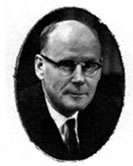 "Leave it to George." The George in this case was the Honourable George James McIlraith, Q.C., long-time representative of Ottawa West, who by dint of perseverance succeeded in becoming almost a permanent fixture in the machine that ran the Liberal Party, and hence the Government of Canada, for most of the years from 1940 to his retirement as Senator in 1983.
"Leave it to George." The George in this case was the Honourable George James McIlraith, Q.C., long-time representative of Ottawa West, who by dint of perseverance succeeded in becoming almost a permanent fixture in the machine that ran the Liberal Party, and hence the Government of Canada, for most of the years from 1940 to his retirement as Senator in 1983.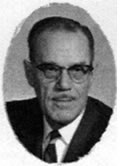 Jay Waldo Monteith. The name has to be spoken aloud to savour the fullness of it. Born in 1903, his lineage included a grandfather, member of the Ontario Legislature from 1867 to 1873, and his father, member of the Ontario Legislature from 1923 to 1934.
Jay Waldo Monteith. The name has to be spoken aloud to savour the fullness of it. Born in 1903, his lineage included a grandfather, member of the Ontario Legislature from 1867 to 1873, and his father, member of the Ontario Legislature from 1923 to 1934.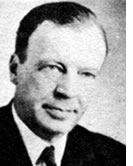 There were two Nowlans, father and son, who came into my ken during the time I worked on Hansard. The father, the Honourable George Clyde Nowlan, set standards that were high for the son to emulate, and comparisons were inevitable.
There were two Nowlans, father and son, who came into my ken during the time I worked on Hansard. The father, the Honourable George Clyde Nowlan, set standards that were high for the son to emulate, and comparisons were inevitable.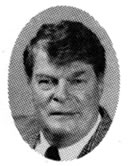 His son, John Patrick Nowlan, foreshortened to Pat, undoubtedly took the short end of the stick when gauged against the father, but this is oversimplification. Born in 1931, he was a child during World War II, and like many a maritimer before him he left Nova Scotia to earn a living elsewhere. That elsewhere happened to be British Columbia, at the far end of the country, where he practised law.
His son, John Patrick Nowlan, foreshortened to Pat, undoubtedly took the short end of the stick when gauged against the father, but this is oversimplification. Born in 1931, he was a child during World War II, and like many a maritimer before him he left Nova Scotia to earn a living elsewhere. That elsewhere happened to be British Columbia, at the far end of the country, where he practised law.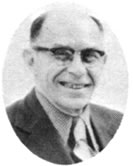 Of the almost 3,000 Canadians who served as Members of Parliament from 1960 to 1994, 1,106 were new Members whose faces and voices had to be recognized by the staffs of two branches, the Clerks at the Table and the people of Hansard, English and French.
Of the almost 3,000 Canadians who served as Members of Parliament from 1960 to 1994, 1,106 were new Members whose faces and voices had to be recognized by the staffs of two branches, the Clerks at the Table and the people of Hansard, English and French.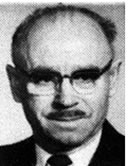 Reynold Rapp, the member for Humboldt-Melfort-Tisdale, occupies a special niche in any work dealing with the accomplishments of backbenchers. His story is overlooked, and merits at least a brief retelling.
Reynold Rapp, the member for Humboldt-Melfort-Tisdale, occupies a special niche in any work dealing with the accomplishments of backbenchers. His story is overlooked, and merits at least a brief retelling.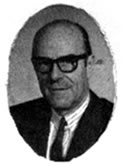 Mention of Mr. Rapp's acquisition of Canadian citizenship causes the intrusion of another personal note and an acknowledgment of the selfless work, as parliamentarian and citizenship judge, performed by the long-tenured Member for Ottawa East, Jean-Thomas Richard.
Mention of Mr. Rapp's acquisition of Canadian citizenship causes the intrusion of another personal note and an acknowledgment of the selfless work, as parliamentarian and citizenship judge, performed by the long-tenured Member for Ottawa East, Jean-Thomas Richard.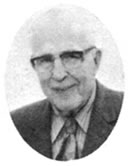 "Is there a doctor in the House?' There was no need to ask that question in the late 1950s and throughout the 1960s. The member for Simcoe East was the doctor on call for any and all emergencies involving colleagues and members of the staff. Philip Bernard Rynard was that member, but I never heard him addressed as other than Dr. Rynard.
"Is there a doctor in the House?' There was no need to ask that question in the late 1950s and throughout the 1960s. The member for Simcoe East was the doctor on call for any and all emergencies involving colleagues and members of the staff. Philip Bernard Rynard was that member, but I never heard him addressed as other than Dr. Rynard.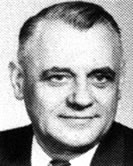 "What did he say, Mike? What did he say?" The man who was asked the question was the Honourable Michael Starr, member for the singularly named riding of Ontario in the province of Ontario, and the man who asked the question was his seatmate, the Right Honourable John George Diefenbaker, his party's chief and Leader of Her Majesty's Loyal Opposition.
"What did he say, Mike? What did he say?" The man who was asked the question was the Honourable Michael Starr, member for the singularly named riding of Ontario in the province of Ontario, and the man who asked the question was his seatmate, the Right Honourable John George Diefenbaker, his party's chief and Leader of Her Majesty's Loyal Opposition.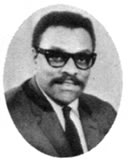 Another to hold the chairmanship of the same but renamed Worker's Compensation Board of Ontario was the Honourable Lincoln Macauley Alexander, who succeeded Starr in 1980.
Another to hold the chairmanship of the same but renamed Worker's Compensation Board of Ontario was the Honourable Lincoln Macauley Alexander, who succeeded Starr in 1980.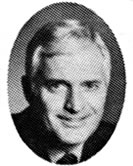 Following on Trudeau as leader of the Liberal Party came John Napier Turner, one of the ill fated stars in the Canadian political firmament.
Following on Trudeau as leader of the Liberal Party came John Napier Turner, one of the ill fated stars in the Canadian political firmament.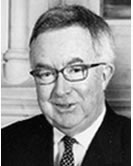 Hard on the heels of the ill fated Turner came Joseph Charles Clark, one of the most intriguing figures ever cast up on the shores of Canadian politics.
Hard on the heels of the ill fated Turner came Joseph Charles Clark, one of the most intriguing figures ever cast up on the shores of Canadian politics.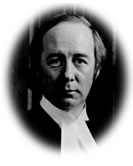 The Honourable James A. Jerome, the Member for Sudbury, occupied the position of Speaker from September 30, 1974 until December 14, 1979. He held the reins of office loosely. It wasn't that he lacked a firm hand. On occasion his peremptory rulings prevented outbreaks of trouble from developing further, but he had the misfortune to create a degree of animosity on the part of Opposition members.
The Honourable James A. Jerome, the Member for Sudbury, occupied the position of Speaker from September 30, 1974 until December 14, 1979. He held the reins of office loosely. It wasn't that he lacked a firm hand. On occasion his peremptory rulings prevented outbreaks of trouble from developing further, but he had the misfortune to create a degree of animosity on the part of Opposition members.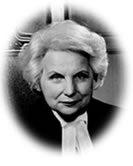 The
Honourable Jeanne Sauvé was born April 26, 1922, in Prud'homme, Saskatchewan, daughter of French-Canadian parents. Her husband Maurice, a native of Québec, was a minister in the cabinets of Lester B. Pearson, where he held the posts of Forestry and the expanded Forestry and Rural Development departments, before going down to defeat in the General Election of 1968. He was a capable minister, somewhat overshadowed by his more forceful spouse who became a Member of Parliament four years later in 1972. Her rise to prominence was rapid, first Minister of State for Science and Technology, then Minister of the Environment, and lastly Minister of Communications. In 1980 she was elected first woman Speaker of the House of Commons.
The
Honourable Jeanne Sauvé was born April 26, 1922, in Prud'homme, Saskatchewan, daughter of French-Canadian parents. Her husband Maurice, a native of Québec, was a minister in the cabinets of Lester B. Pearson, where he held the posts of Forestry and the expanded Forestry and Rural Development departments, before going down to defeat in the General Election of 1968. He was a capable minister, somewhat overshadowed by his more forceful spouse who became a Member of Parliament four years later in 1972. Her rise to prominence was rapid, first Minister of State for Science and Technology, then Minister of the Environment, and lastly Minister of Communications. In 1980 she was elected first woman Speaker of the House of Commons.